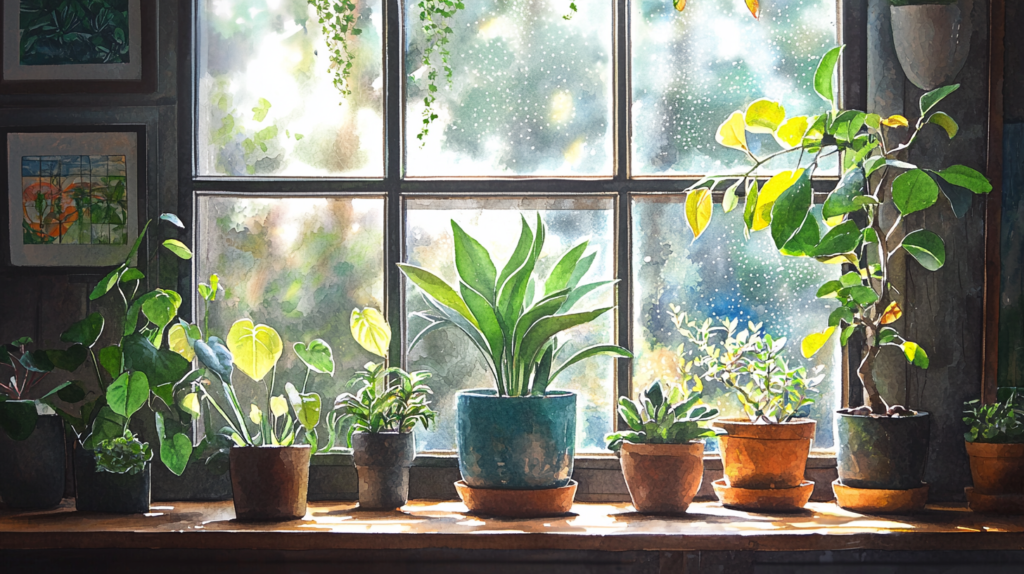The modern world is a swirling vortex of neverending anxieties, push notifications, and general existential dread. We’re all just trying to keep our heads above the ever-rising tide of doomscrolling. But no need to worry – there’s a simple, affordable, and eco-friendly solution: houseplants. Those leafy companions sitting in the corner are more powerful for mental well-being than they might seem.
Forget expensive retreats and mindfulness apps; the true path to inner peace lies in nurturing a philodendron. And it is not just wabbling about a vague sense of “nature is nice.” Let’s take a peek at the science behind this.
The Science of Serenity: Why Green Makes You Gleam
Recent research has illuminated the profound connection between indoor plants and mental well-being. A study published in the Journal of Physiological Anthropology found that interacting with houseplants can significantly reduce physiological and psychological stress. Participants who engaged in tasks like repotting and touching plants experienced a marked decrease in cortisol levels (the stress hormone) and a boost in feelings of comfort.
Essentially, we’re hardwired to respond positively to greenery. It’s a primal thing, a throwback to our hunter-gatherer days when spotting a lush patch of foliage meant “water and berries, hooray!” Nowadays, it translates to “reduced anxiety and a slightly less chaotic inner monologue.”
Another study, this time from the Journal of Environmental Horticulture, highlighted the therapeutic benefits of simply looking at plants. Participants reported improved attention spans and reduced mental fatigue after spending time in a plant-filled environment. So, if you’re struggling to focus on that spreadsheet, just surround yourself with a jungle of succulents. It’s practically productivity hacking.
And don’t forget the air quality. Plants are little oxygen factories, sucking up nasty pollutants, and pumping out fresh, clean air. It’s like having a tiny, chlorophyll-powered air purifier. Indoor plants can significantly reduce levels of volatile organic compounds (plastic smell), which can contribute to headaches, fatigue, and even respiratory issues. So, breathe deep, and let the peace lily work its magic.
The Ritual of Repotting: A Zen Garden in a Pot
Beyond the scientific data, there’s something deeply satisfying about the act of caring for plants. It’s a ritual, a connection to the natural world in a concrete jungle. The simple act of watering, pruning, and repotting can be surprisingly meditative.
Think about it: you’re focused on the present moment, on the texture of the soil, the delicate unfolding of a new leaf. You’re not thinking about that passive-aggressive email from your boss or the existential dread of your student loan debt. You’re just a human, a pot, and a plant, finding a moment of shared existence.
And let’s not forget the sense of accomplishment! Successfully propagating a cutting or coaxing a stubborn orchid into bloom is like winning a tiny, green lottery. It’s a tangible reminder that you can nurture something, that you can make things grow. Even if your social life is withering like a neglected fern, your plants will always be there, silently applauding your horticultural prowess.
The Social Life of a Plant Parent: From Lonely to Leafy
In the age of social media, plant parenting has become a full-blown phenomenon. #Plantsofinstagram is a teeming jungle of meticulously styled foliage, where people share their leafy triumphs and commiserate over pest infestations. It’s a community, a shared passion, a support group for those who prefer their friends to be photosynthetic.
Online plant communities are a treasure trove of knowledge, advice, and, let’s be honest, a healthy dose of plant-shaming (looking at you, overwaterers). But it’s also a place where you can connect with like-minded individuals, share your plant-related woes, and celebrate your leafy victories.
And let’s not forget the sheer joy of showing off your plant collection. “Oh, this? It’s just a rare variegated monstera I picked up at the local nursery. No big deal.” It’s a subtle flex, a way to signal your refined taste and impeccable horticultural skills. Plus, it’s a great conversation starter, especially if you’re looking to impress a potential date with your green thumb.
Of course, like any good thing, plant parenting can veer into the realm of obsession. There’s a fine line between a healthy hobby and a full-blown jungle takeover. And let’s not even talk about the plant-buying addiction. One minute you’re browsing the local nursery, the next you’re ordering rare succulents from a shady online dealer in Uzbekistan. It’s a slippery slope!
Then there’s the constant worry. “Is my plant getting enough light?” “Am I overwatering?” “Is that a mealybug or just a speck of dust?” It’s a never-ending cycle of anxiety, a constant battle against pests, diseases, and the inevitable demise of a beloved plant. But even in the face of plant-related disasters, there’s a lesson to be learned. Plants teach us resilience, patience, and the acceptance of impermanence. They remind us that even in the face of death, there’s always the possibility of new growth, a new leaf, a new beginning.
And don’t forget physical benefits!
Gardening counts as moderate physical activity, which is good for the heart. Spending time outdoors in nature has a calming effect, which can help lower blood pressure. In addition, gardening can help tone muscles, burn calories, and support dexterity and balance – all ways it benefits physical health. The best part is that it does all of this in a gentle way, easier on the body than some other forms of exercise.
The process of gardening, and plant breeding often involves patience and delayed gratification, as plants require time to grow and show results. This aspect of nurturing our green friends over time can foster a sense of purpose, mindfulness, and actually contribute to your longevity.
So, here is the conclusion: houseplants are more than just decorative objects; they’re mental health allies, stress-busters, and tiny green therapists. They offer a connection to nature, a sense of accomplishment, and a community of like-minded individuals. Embrace your inner botanist, nurture your leafy companions, and watch your mental health flourish.


